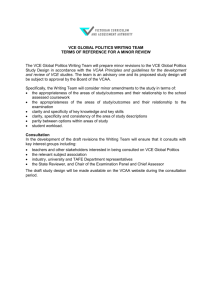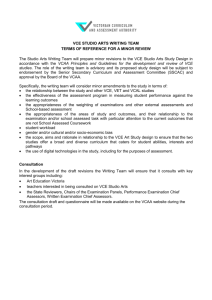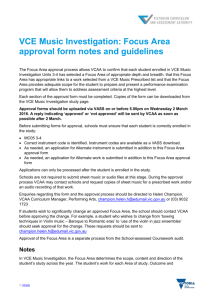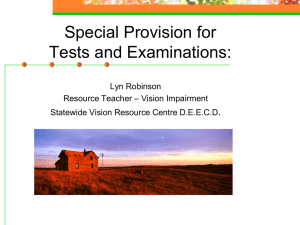11.4.1 Eligibility for Special Examination Arrangements Page 122
advertisement
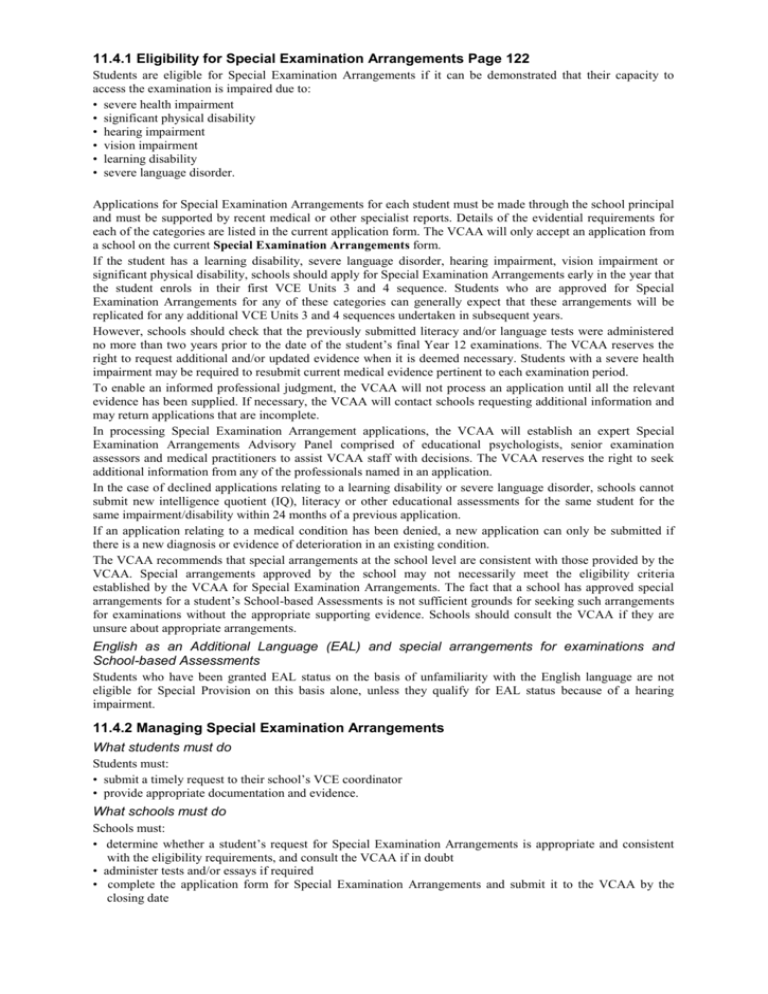
11.4.1 Eligibility for Special Examination Arrangements Page 122 Students are eligible for Special Examination Arrangements if it can be demonstrated that their capacity to access the examination is impaired due to: • severe health impairment • significant physical disability • hearing impairment • vision impairment • learning disability • severe language disorder. Applications for Special Examination Arrangements for each student must be made through the school principal and must be supported by recent medical or other specialist reports. Details of the evidential requirements for each of the categories are listed in the current application form. The VCAA will only accept an application from a school on the current Special Examination Arrangements form. If the student has a learning disability, severe language disorder, hearing impairment, vision impairment or significant physical disability, schools should apply for Special Examination Arrangements early in the year that the student enrols in their first VCE Units 3 and 4 sequence. Students who are approved for Special Examination Arrangements for any of these categories can generally expect that these arrangements will be replicated for any additional VCE Units 3 and 4 sequences undertaken in subsequent years. However, schools should check that the previously submitted literacy and/or language tests were administered no more than two years prior to the date of the student’s final Year 12 examinations. The VCAA reserves the right to request additional and/or updated evidence when it is deemed necessary. Students with a severe health impairment may be required to resubmit current medical evidence pertinent to each examination period. To enable an informed professional judgment, the VCAA will not process an application until all the relevant evidence has been supplied. If necessary, the VCAA will contact schools requesting additional information and may return applications that are incomplete. In processing Special Examination Arrangement applications, the VCAA will establish an expert Special Examination Arrangements Advisory Panel comprised of educational psychologists, senior examination assessors and medical practitioners to assist VCAA staff with decisions. The VCAA reserves the right to seek additional information from any of the professionals named in an application. In the case of declined applications relating to a learning disability or severe language disorder, schools cannot submit new intelligence quotient (IQ), literacy or other educational assessments for the same student for the same impairment/disability within 24 months of a previous application. If an application relating to a medical condition has been denied, a new application can only be submitted if there is a new diagnosis or evidence of deterioration in an existing condition. The VCAA recommends that special arrangements at the school level are consistent with those provided by the VCAA. Special arrangements approved by the school may not necessarily meet the eligibility criteria established by the VCAA for Special Examination Arrangements. The fact that a school has approved special arrangements for a student’s School-based Assessments is not sufficient grounds for seeking such arrangements for examinations without the appropriate supporting evidence. Schools should consult the VCAA if they are unsure about appropriate arrangements. English as an Additional Language (EAL) and special arrangements for examinations and School-based Assessments Students who have been granted EAL status on the basis of unfamiliarity with the English language are not eligible for Special Provision on this basis alone, unless they qualify for EAL status because of a hearing impairment. 11.4.2 Managing Special Examination Arrangements What students must do Students must: • submit a timely request to their school’s VCE coordinator • provide appropriate documentation and evidence. What schools must do Schools must: • determine whether a student’s request for Special Examination Arrangements is appropriate and consistent with the eligibility requirements, and consult the VCAA if in doubt • administer tests and/or essays if required • complete the application form for Special Examination Arrangements and submit it to the VCAA by the closing date • ensure that all information provided on the application form is accurate, and that no alterations have been made to evidence supplied • advise the student and the Chief Supervisor of any VCAA-approved arrangements • ensure these decisions are printed by the VASS coordinator and distributed to the student, Chief Supervisor and VCE coordinator. What the VCAA will do The VCAA will: • make a decision for each of the examinations on the application • advise the school via VASS of the outcome of the application. Any attempt by a student to falsely claim to an examination supervisor to have Special Examination Arrangements when these have not been approved by the VCAA constitutes a breach of examination rules and must be reported to the VCAA. 11.4.5 Learning disability Page 126 The VCAA has adopted the following operational definition of learning disability for the purposes of granting Special Examination Arrangements. A student with a learning disability must have an average or above IQ and have developmental and academic skills that are significantly below expectation for their present grade level. The disabilities are presumed to be intrinsic to the individual and long term, but not considered to be the direct result of intellectual disability, physical disability, sensory impairments or emotional difficulties, nor derived directly from inadequate environmental experiences, or lack of appropriate educational experiences. Evidence required to support a learning disability application The VCAA has assessed and approved the following tests for determining eligibility for Special Examination Arrangements. 1. IQ tests An IQ assessment administered by a registered psychologist during the student’s secondary school years is required. The VCAA will accept the following IQ tests: • Wechsler Intelligence Scale for Children (WISC) IV • Wechsler Adult Intelligence Scale (WAIS) III or IV • Stanford Binet IV or V. The scores should include subtest scaled scores, verbal and performance scale scores, full-scale IQ scores and appropriate index scores. The Special Examination Arrangements Application form contains a standard format for the reporting of IQ assessment details. A copy of the psychologist’s report is also required. 2. Literacy assessments reading The VCAA has adopted the following criteria to determine the suitability of tests to measure reading ability. The test should be: • a silent reading comprehension test (this reflects the silent reading conditions of an examination) • a timed test • published with Australian norms. The VCAA must be able to access the test and its normative data. The purpose for using such reading tests is to establish whether a student’s reading level is significantly below what is expected of an average Year 12 student. The following tests meet the above criteria and provide normative data that are suitable for determining whether a student’s reading ability is at such a level. The current prescribed reading test is Progressive Achievement Test in Reading (PAT-R) published by ACER. The VCAA will accept results from either: • Comprehension Test Form 4 (third edition 2001) or • Comprehension Booklet 10 (fourth edition 2008). Evidence of a student’s reading comprehension skills must be based on a test administered in either the year the student commences the VCE or in Term 4 of the previous year. A student with a reading disability may be approved extra reading time (up to a maximum 10 minutes per hour). Extra reading time approved by the VCAA will be incorporated into the examination writing time so that the student is able to utilise the extra time more effectively. A student with a severe reading disability may be allowed to use a reader. 3. Literacy assessments – written expression Assessment of a student’s level of written expression involves an assessment of several variables, including the following: • thought and content • structure and organisation • expression and/or language • handwriting • productivity • spelling • punctuation The following evidence is required in support of applications for Special Examination Arrangements for a disorder of written expression. 1. Two handwritten essays (if the application is for extra writing time, a scribe and/or a computer) administered at the school under test/examination conditions. −− The topic for Essay One will be supplied by the VCAA. Strictly five (5) minutes reading time and 30 minutes writing time are to be provided. No Special Examination Arrangements are to be used for this essay. −Essay Two should be a copy of a handwritten English or Literature essay from an assessment that the student has recently completed (approximately within the previous three months) at school for either School-assessed Coursework or a school examination. The essay must have been marked with teacher comments and the teacher’s grading should be indicated. The essay topic, the time taken for this essay, the date of the assessment and details of any approved Special Examination Arrangements used by the student should be recorded on the Essay Two Cover Sheet. The essay must not be a short-answer response or have been written in another language. If the student is completing a Units 3 and 4 study that does not involve extended responses or essays, the VCAA will accept an English examination or similar assessment from Term 4 of the previous year. 2. One typed essay (if the application is for the use of a computer) or one scribed essay (if the application is for the use of a scribe) administered at the school under examination conditions. − The topic for the typed essay will be supplied by the VCAA. Strictly five (5) minutes reading time and 30 minutes writing (typing) time should be provided. Apart from the computer, no additional Special Examination Arrangements (for example, extra time) should be used for this essay. − The topic for the scribed essay will be supplied by the VCAA. Strictly five (5) minutes reading time and 35 minutes writing (scribing) time should be provided. Student and scribe should be supervised according to VCAA examination rules. The relevant section of the Special Examination Arrangements application form has further details of the specific requirements for essay completion and must be noted by the school. Note that essays should be completed at school and supervised by school staff. The supervising teacher must remain with the student for the duration of the writing to observe the student’s performance and ensure that the time restrictions are observed. All essays are to be completed under examination conditions (no assistance or prompting from the supervising teacher). The supervising teacher should complete all relevant information on the essay cover sheet. The results of the South Australian Spelling Test may be submitted by the school if it considers this to be useful. The results of the spelling test alone will not determine eligibility for Special Examination Arrangements. The key evidence required is the effect of poor spelling on a student’s handwriting speed or written expression and this is best determined from an evaluation of that student’s essays. Requests for Special Examination Arrangements for students experiencing major handwriting difficulties (which arise from long-term developmental, fine-motor coordination problems and not from a severe health impairment or significant physical disability or injury) must be supported by an IQ assessment conducted during the student’s secondary school years and the appropriate essay evidence.


